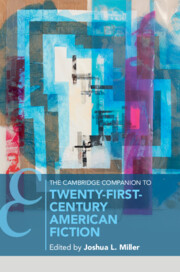Book contents
- The Cambridge Companion to Twenty-First-Century American Fiction
- The Cambridge Companion to Twenty-First-Century American Fiction
- Copyright page
- Contents
- Illustrations
- Contributors
- Acknowledgments
- Chronology
- Introduction
- Part I Forms
- Part II Approaches
- Part III Themes
- 11 Convergence
- 12 Dissolution
- 13 Immobility
- 14 Insecurity
- Further Reading
- Index
12 - Dissolution
from Part III - Themes
Published online by Cambridge University Press: 02 September 2021
- The Cambridge Companion to Twenty-First-Century American Fiction
- The Cambridge Companion to Twenty-First-Century American Fiction
- Copyright page
- Contents
- Illustrations
- Contributors
- Acknowledgments
- Chronology
- Introduction
- Part I Forms
- Part II Approaches
- Part III Themes
- 11 Convergence
- 12 Dissolution
- 13 Immobility
- 14 Insecurity
- Further Reading
- Index
Summary
Crystal Parikh’s chapter on dissolution takes up narrative fragmentation to thematize outward-moving fictions of “interruption, isolation, suspense, and precarity.” Starting with Valeria Luiselli’s interviews with migrant asylum-seekers, Parikh argues that a defining feature of contemporary literature is its formal techniques of “dissolution and the fragment as vital aesthetic and stylistic forms to convey the splintering effect that global modernity in the twenty-first century induces.” From Luiselli to George Saunders’s short stories and novels by Celeste Ng and Jesmyn Ward, among others, Parikh argues that nineteenth- and twentieth-century narrative techniques have been remixed by contemporary authors who draw on realism and experimentalism to tell stories of ongoing and unresolved dislocation and vulnerability.
Keywords
- Type
- Chapter
- Information
- The Cambridge Companion to Twenty-First Century American Fiction , pp. 234 - 250Publisher: Cambridge University PressPrint publication year: 2021

